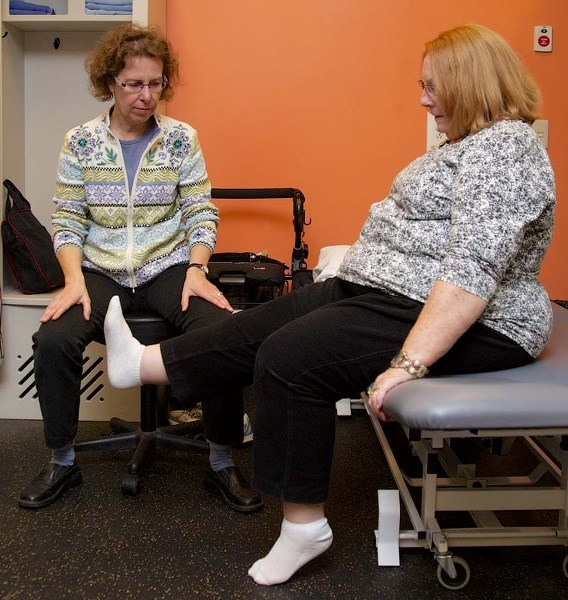After three surgeries to her hip and knees, Barbara Carson knows a thing or two about rehabilitation. Yet it wasn’t until her last surgery that she felt less anxious and more prepared thanks to a new research program on “prehabilitation.”
The eight-week treatment uses education and patient-tailored exercise programs, as well as regular visits and phone calls by a physiotherapist, to prepare patients for their surgery and talk about pain management.
It is specifically designed for patients with chronic conditions who have difficulty coping at home, such as St. Albert-based Carson, who is now 70 and has to drive at least half an hour to get to the Edmonton Kaye Clinic for her treatment.
“I can’t praise the program enough, it was so beneficial,” she said. “I was more prepared for the surgery this time and I was healthier and I was also stronger so the recovery afterwards went better.”
The treatment is not a common therapy for hip and knee replacement patients yet, though that could change in the future, said researchers Allyson Jones and Lauren Beaupre, both associate professors in the Faculty of Rehabilitation Medicine at the University of Alberta.
In their study, the two women separated two groups of 120 patients. One group received the extra treatment while the other group went through the general preparation that takes place before any major surgery – usually a one-time meeting with a doctor.
While regular patients were more anxious and unprepared before and after their surgery – often leading to a prolonged recovery phase – the patients who received regular visits by a physiotherapist were more confident and recovered faster, said Beaupre.
“They just find huge value in the fact that they have regular contact with a physiotherapist before the treatment and the surgery and were able to talk to someone and ask questions and demonstrate the exercises,” she said.
Jones added that the program did not restore function to damaged joints or take away the patient's pain.
But their mental preparedness aided a faster recovery, she said, which may also keep more people at home after their surgery rather than feeling the need to go to the doctor all the time.
Though more research is still necessary, the researchers hope that their findings can be integrated in the health care system one day.
“We can change the trajectory of recovery because (the patients) are more educated and understand what is happening,” Jones said. “If we can get people less anxious, less worried about their surgery and knowing what to expect, they do much better.”
Carson said her physiotherapist visited her for at least three weeks and then called her regularly, working out exercise programs and giving her someone to talk to. She said prehabilitation helped her because someone pushed her to take the extra step.
“It’s hard when you are by yourself and it’s hard when you are hurting,” she said. “It was a big help toward the healing afterwards.”




